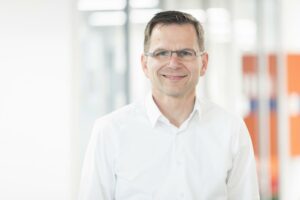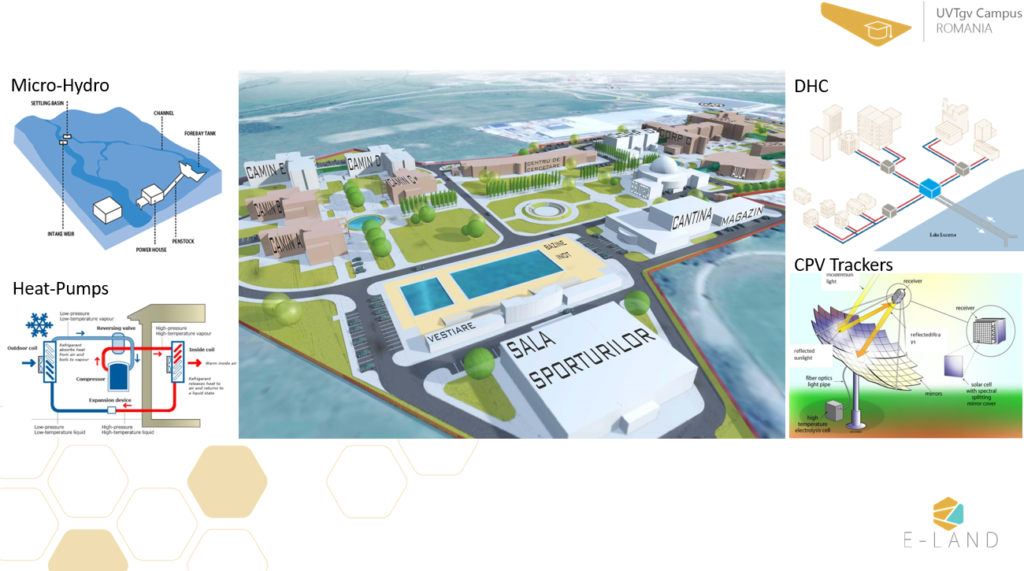University as an Energy Island: Achieving carbon-neutrality with the ELAND Toolbox
By Dorin Let, Merla Kubli, Moritz Loock 9. June 2020
“Take urgent action to combat climate change and its impacts”[1] is one of the Sustainable Development Goals of the United Nations. To contribute to this goal, the ELAND project develops a toolbox that helps to set-up low-carbon Energy Islands.
Energy islands access and coordinate renewable energy sources in the area effectively, so that nearly all energy demand can be covered locally, avoiding far-traveled energy from carbon-intense sources. The Energy Islands approach can be particularly interesting for universities that intend to have a green campus and aim to be carbon neutral. For instance, the University of St. Gallen has implemented a Climate Solution Taskforce to coordinate the efforts of becoming carbon neutral by 2030. The ELAND toolbox can support such strategies and provides tools to develop a carbon-neutral energy system at universities.
An example to follow
Universities aiming for carbon neutrality can of course learn from other green campus initiatives such as the EUREF campus in Berlin[1]. Nevertheless, universities often have specific requirements that are not addressed in other initiatives: A university campus hosts a specific community of students, academics, and other university stakeholders. An energy system of a university needs to enable research and teaching, it needs to satisfy the requirements of public ownership, and at the same time also shall be inspirational to students, motivating them to implement climate solutions in their future professional career. A climate-neutral university should be informative about the state-of-the-art opportunities for implementing carbon neutrality through clean energy production and usage, energy efficiency, and cross-energy vector optimization.

Prof. Rolf Wüstenhagen (Photo: St. Gallen University)
Professor of Management of Renewable Energies, University of St. Gallen:
“It is inspiring to learn from initiatives like the one at Valahia University of Târgoviște to see how renewable energy can become an integral part of our campus.”
The ELAND pilot site at the Valahia University of Târgoviște from Romania provides important insights into the process of achieving carbon neutrality. The newly developed Campus site, extends over 15ha, two faculty buildings (~21000sqm net space), and three dorm buildings that host around 1500 students. Three more constructions are underway, and seven more planned. The current operational buildings can be organized in four different building types by load profiles, which are tied to 1 administrative/office building, 2 faculty/laboratory buildings, 1 research infrastructure/tertiary building, and 3 dormitories.
The enabler of disruptive innovation
The Research Institute – ICSTM acts as a living laboratory for nearly zero-energy buildings and integration of renewable energies since 2016. Building-integrated photovoltaics along with small wind turbines provide local electricity generation, which is then coupled with stationary storage. A microgrid system provides electrical security for situations with critical loads. Solar thermal with storage, coupled with adsorption chillers, are used as heat input for the Heating Ventilation Air Conditioning and Refrigeration.
The building’s automation system controls all installations and provides weather compensated load optimization, along with alarms and operational safety. The ELAND project integrates the existing building management system and a newly developed Campus level energy management system to Demand Side Management techniques (load optimization based on predicted energy generation intraday/weekly). The heart of the multi-vector approach is the generation forecasting and load prediction that is coupled with storage, which creates the needed fusion in this energy mix. Synergies of the different control systems will boost renewable energy penetration and increase stakeholders’ comfort. Overall, the local energy system optimization will contribute to the building stock decarbonization.

The implementation of the ELAND toolbox to decarbonize a university campus coupled with its multi-vector approach, in a complex energy mix, can be the enabler of disruptive innovation. The ELAND toolbox captures specific tools to engage the university stakeholders to win their support and mobilize the university community to build its own energy island.
Social media
E-LAND updates

The E-LAND project aims to develop and demonstrate tools for energy systems to overcome the technical, business, and societal challenges associated with the creation of… (1 year ago)

E-LAND exploitation enhancement activities kickstarted for the final project year Multiple events were executed and many more are planned for the E-LAND project’s final year.… (2 years ago)

A central pillar of the E-LAND project's is risk management. The Norwegian consortium member, Institute for Energy Technology (IFE), implemented a risk management approach to… (2 years ago)

E-LAND H2020 is working with creating a toolbox that is designed to optimize and control multi-energy islands and isolated communities. The toolbox is structured in… (2 years ago)

Smart Innovation Norway together with the University of St. Gallen have developed a series of workshops that began in June 2021 and focused on the… (2 years ago)

About the pilot site: Port of Borg is situated in an industrial area on a small peninsula called Øra just outside Fredrikstad, Norway. Port work… (2 years ago)

Since the mid-1960s, the township of Auroville in Southern India has been striving for sustainable living and the realization of human unity in diversity. In… (2 years ago)